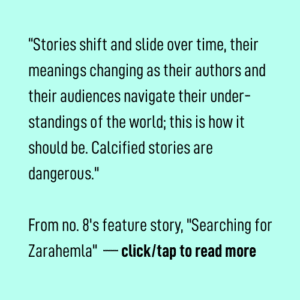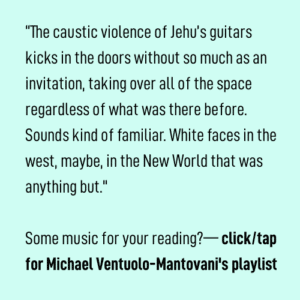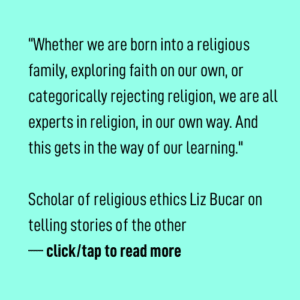Laurie Penny
no. 8, The Road Trip Issue
Autumn 2022
There are lots of ways to tell a story, if you can get someone to listen.
In 2001, when Twitter was no more than a glint in Elon Musk’s wallet and I was navigating the weirder tributaries of adolescence, I had a thing about the history of the printing press. I got fixated on the development of moveable type, how it remade human beings’ capacity to understand each other, and how we had to learn to understand each other better, and faster, and at scale. I remember monopolizing helpless adults with monologues about how the Gutenberg printing press and the translation of the Bible into English broke the totalizing power of church and crown and kicked off centuries of bloody religious war and eventually gave us the Enlightenment. I went through a phase of explaining this to anyone who would listen. In retrospect, that explains a lot.
Luckily for anyone who was that sort of kid, there was, all of a sudden, the internet. That meant chatrooms and flash videos and strangers who also wanted to talk about how the thing we weren’t yet calling social media might change what it meant to be a person in the world with other people, as long as we could also talk about Buffy the Vampire Slayer. It didn’t matter that you couldn’t understand how the kids in your class talked to each other when you could go home and fall into an infinite research hole and meet people whose idea of fun was trying to figure out whether the real inflection point was the invention of the press itself or the printing of the Gutenberg Bible, when for the first time authority figures could not stop people from talking to about the different ways they experienced god. I wasn’t all that personally anxious to experience god, but I did want to see a copy of the Gutenberg Bible.
* * *
It all started when the strangest of my mother’s brothers got me to be quiet for five minutes by giving me a copy of Marshall McLuhan’s 1962 book The Gutenberg Galaxy, which describes the printing press as an evolutionary-forcing invention and mass communication as the next stage in that evolution. The core idea — get this, right, this is brilliant — is that how humans talk to each other, how fast, and how much, is orders of magnitude more transformative than what we talk about. McLuhan wrote that the acceleration of communication technology was about to turn a planet of relative strangers into a “global village,” which sounds cozy enough if you’ve never lived in an actual village.
Fifty years later in the Atlantic, Jonathan Haidt attempted to explain the relentless civil crisis of clashing histories and culture wars spurting from the open veins of social media as a “new Babel”: that the best analogy for the confusion and division that wrecked the dream of the internet as a democratizing force that would connect the world, is the biblical story of the Tower of Babel. That’s the one in the Book of Genesis where God punishes humanity for its being arrogant enough to build a massive tower by taking away their language, saying that “the people is one, and they have all one language… and now nothing will be restrained from them, which they have imagined to do…let us go down, and there confound their language, that they may not understand one another’s speech.”
That’s how most English speakers would have first read the story because that’s how the story goes in the King James Bible. That’s the definitive iteration of Christian scripture, translated and printed and sanctioned by the British crown in 1604, less than a century after people had regularly been burned at the stake for suggesting that ordinary people might be allowed to read their central sacred text in their own language. Print technology made it impossible to prevent the plate tectonics of cultural change, so church authorities had to make sure everyone was at least reading from the same text. The need to avoid a new Babel was much on the minds of the King James translators, who might have described their ideologically-shambolic, post-Gutenberg age much as Jonathan Haidt describes, “what happened to America in the 2010s….Something went terribly wrong, very suddenly. We are disoriented, unable to speak the same language or recognize the same truth.”

We — by which Haidt means America and by hastily-built extension, the rest of the notionally democratic, notionally liberal world — are telling too many different stories about who we are and where we’ve come from. We no longer inhabit the same consensus reality. That can only lead to chaos, so we need to return to a common narrative of the past. A collective story of nation. A universal set of priorities, preferably the ones “we” agreed on several centuries ago, when the world was tidier and gentlemen weren’t expected to pay attention to anyone whose lived experience was less gentle than their own.
The difference this time, and the point where Haidt’s analogy breaks down, is that our current culture wars are not driven by a dearth of mutual comprehension, but a surfeit. Suddenly, human beings can’t help finding out about each other and that doesn’t always feel safe, Because the better we understand each other, the more we understand that we are, in fact, more different than we had imagined. Suddenly, nobody has to wait for anyone else to finish speaking, and those who have usually had to silence themselves for their own safety are sharing their stories in a new, coordinated way. Women and girls are speaking about sexual violence. People of color are talking about structural racism. Queer and trans people are comparing notes and coming up with new ways to live outside the narrative of straight, cisgender social norms.
There’s more than one way to tell a story, and that’s the problem. It’s always been the problem when you’re dealing with the species-level question of how we’re supposed to live together without tearing each other apart.

* * *
There is precedent: the print revolution that birthed liberal democracy, the Enlightenment, the scientific method, and suffrage, also brought us hundreds of years of brutal wars of faith, as the mighty, united medieval Christian church shattered into dozens of savage ideological factions. Previously, conversations about the nature of god and the distribution of power had been restricted to those who could read Latin, at a time when few people in medieval Europe had reason to read at all. Latin was the language of the aristocracy, of those permitted to know and annotate and rewrite the rules of property and power.
They still teach it to their children and to people who go to posh schools with their children, which is why I can read it (although only a little bit better than I can read a room). But even in the sinister privilege bubble of British private school, there were other weird kids who couldn’t work out where they belonged in the single story of society and their expected place in it, and if we couldn’t talk to each other at school, we could find each other online. On LiveJournal and WordPress and the first iterations of Facebook we encountered the sort of communities that only ever made it into the margins of the mainstream.

While that was hardly a noteworthy experience, its speed and scale was: enormous swaths of our lives migrated online. There were communities where it was safe to tell another story about who you were. That was supposed to be a good thing.
Not so long ago, the internet still seemed more exciting than frightening. Futurists and forecasters were telling us that a planet of strangers would come to see how much they had in common; we’d build a new horizontal, networked democratic consensus and ride to an age of peace, love, and understanding on the information superhighway. These days it feels more like dodging traffic, just trying to tell your own truth without getting run down. It turned out that peace and love do not automatically flow from understanding. Instead, the more we got to know about each other — the more ordinary people were able to broadcast the reality of their lived experience without the say-so of what is now called “legacy” media — the clearer it became that they had, in fact, been living in different worlds for a long, long time. There were suddenly infinite possible truths, a cacophony of communication drowning out everything that once felt simple and certain. And when enough people are telling uncomfortable truths about their lives, declaring your difference starts to look like declaring war.
Culture war is what happens when competing realities cannot find a way to coexist. At the beginning of the 2010s, the metastasis of media technology coincided with a collapse in the social consensus, as it had centuries before. The singular story of how society ought to order itself became a chorus of competing ideas. The proliferation of dissenting voices made trusting that single story a ridiculous proposition, which most people sensed was a very big problem for democracy, but there was no consensus about how to fix the problem — or whether anyone should. It was another Gutenberg moment.
Enlightenment-era representative democracy was liberating when it was the alternative to unaccountable murderous monarchies on a continent torn apart by ideological incoherence in Gutenberg’s wake. And it worked for a while, in Europe and then in the United States, as long as the actual deliberation and decision-making could be restricted to a small class of people, the sort of people who spent most of recorded history never having to hear a story they were not the hero of. The sort of people for whom Free Speech once came without the discomfort of having to hear your reality described in a way you don’t recognize. The last generation of that demographic to reach adulthood before social media is still in charge of what’s left of the traditional public sphere. We’ve spent more than a decade trying to persuade them that the species is facing more pressing crises than what the British home secretary called the “tofu-eating wokerati” insisting that racism and sexism are worth talking about, even if it’s uncomfortable. Haidt is right that the model of liberal democracy dreamed up in the 18th century cannot sustain the scale and diversity of 21st-century discourse. It was never designed to.
The post-print world managed to solve the problem of ideological conflict by staging a small, contained war every day. The system of formal debate, for example, holds that the person who humiliates, undermines, or destroys his opponent wins. He wins whether or not his arguments are just, fair, or factually correct. Winning means the problem is solved, and the losing party agrees to live in the victor’s reality. Mutual understanding doesn’t matter. What matters is coming out on top. And this model of public conversation has barely moved on. Today, those charged with solving social injustice and shaping the national narrative still operate with the same machinery of conflict management. It doesn’t work anymore.
It used to work, just about, when the parameters were set and the rules written almost entirely by white, straight, well-to-do Western men; that form of social self-organizing falls apart when the small, self-selecting debate chamber suddenly expands to include the entire rest of the world and its feelings. What you have then is not the basis for civil debate. What you have is a giant shed full of shouting people who do not respect the rituals of Enlightenment democracy in the same way.
You will never get them to agree on who they are, or where they come from. There’s more than one way to tell a story, and our social infrastructure was not built to accommodate that reality.
* * *
The fundamental tragedy of human communication is that almost everyone assumes everyone else sees the world like they do. Almost everyone assumes that almost anyone they meet is in the same story about our shared reality. Almost everyone is wrong about that, but some of us, as a wise friend I met on the internet once told me, are wronger about it than others. It took me thirty-four years and a lot of strangers sharing their stories online for me to understand that there were other people out there who found other people hard to understand the same way I do, other people who, for example, know a lot about the history of the book but never managed to learn to read a room. People who seemed to live in something more like my reality. And the name for what we have in common was autism.
But there’s more than one way to tell a story, and that’s the problem. It’s always been the problem when you’re dealing with the species-level question of how we’re supposed to live together without tearing each other apart.
It’s unsettling, hearing someone else’s structure imposed on the story of your own life. The more sense it makes, the scarier it is to be confronted with another way of reading your own history. Part of finding out you’re autistic in adulthood is finally knowing for certain that your experience of the world is not universal. That there’s a reason you’re used to a certain degree of cognitive dissonance. That most people’s senses and sensitivities work differently from yours, and you might never experience reality the way they do. But that doesn’t make you defective; it doesn’t even have to be lonely. And it makes sense that a kid who grew up misreading signals and being misunderstood got fixated on technologies that help humans make sense to each other. It took me a lot longer to realize that understanding isn’t enough without tolerance, and that sounds too twee and easy until you remember what it’s actually like to have to put up with other people.
What if the time for grand, totalizing narratives of national coherence is over? What if it is no longer possible to sustain a core consensus about our values and priorities? What if the model of community that relies on most of us telling the same story about our social order may not be a fit for the 21st century. We’re having to learn to live with a lot more difference and a deal with more cognitive dissonance than the current model of democracy can sustain, and that feels like a disaster. But it doesn’t have to become one. There are still all sorts of ways this story could end.
Laurie Penny is an award-winning journalist, essayist, public speaker, writer, activist, internet nanocelebrity, and author of seven books. Their most recent book, Sexual Revolution: Modern Fascism and the Feminist Fightback, was published by Bloomsbury in 2022.
Her last piece for Pipe Wrench was “It Was That or Starve,” from no. 3.

More great reading
from Pipe Wrench no. 8
Searching for Zarahemla
Journalist Emily Kaplan recounts an epic Mormon road trip across Mesoamerica. How many ways are there to tell a story? And how do we know what’s true?
The Ethics of Religious Appropriation, Turned Back On Us
Ethicist Liz Bucar looks at how we approach religions that aren’t ours. We can study them and write about them. What we can’t do is recoil.
Las Cruces
Speculative fiction writer Ana Hurtado pens a flash fiction trio that makes the violence of colonialist evangelism vividly, viscerally literal.

